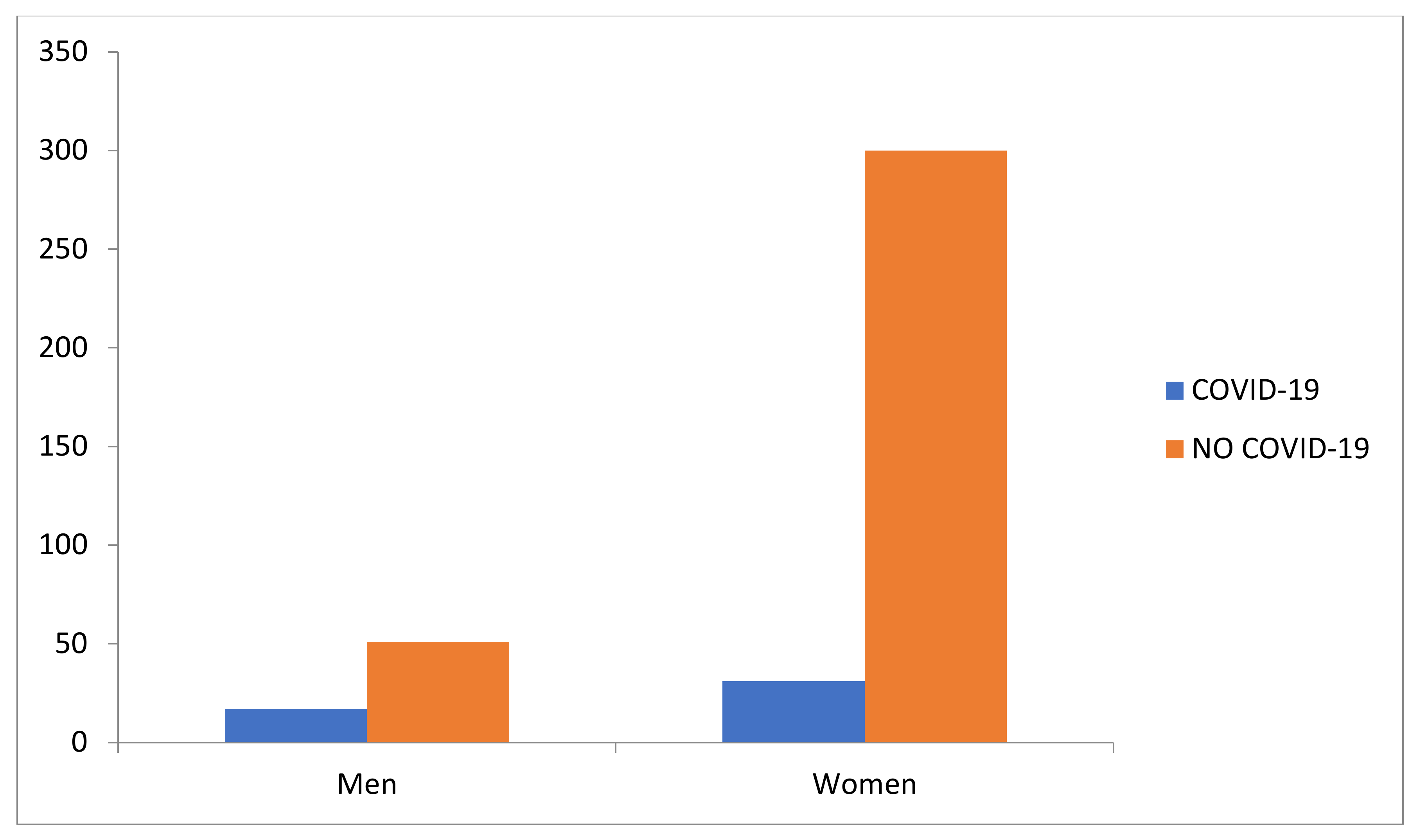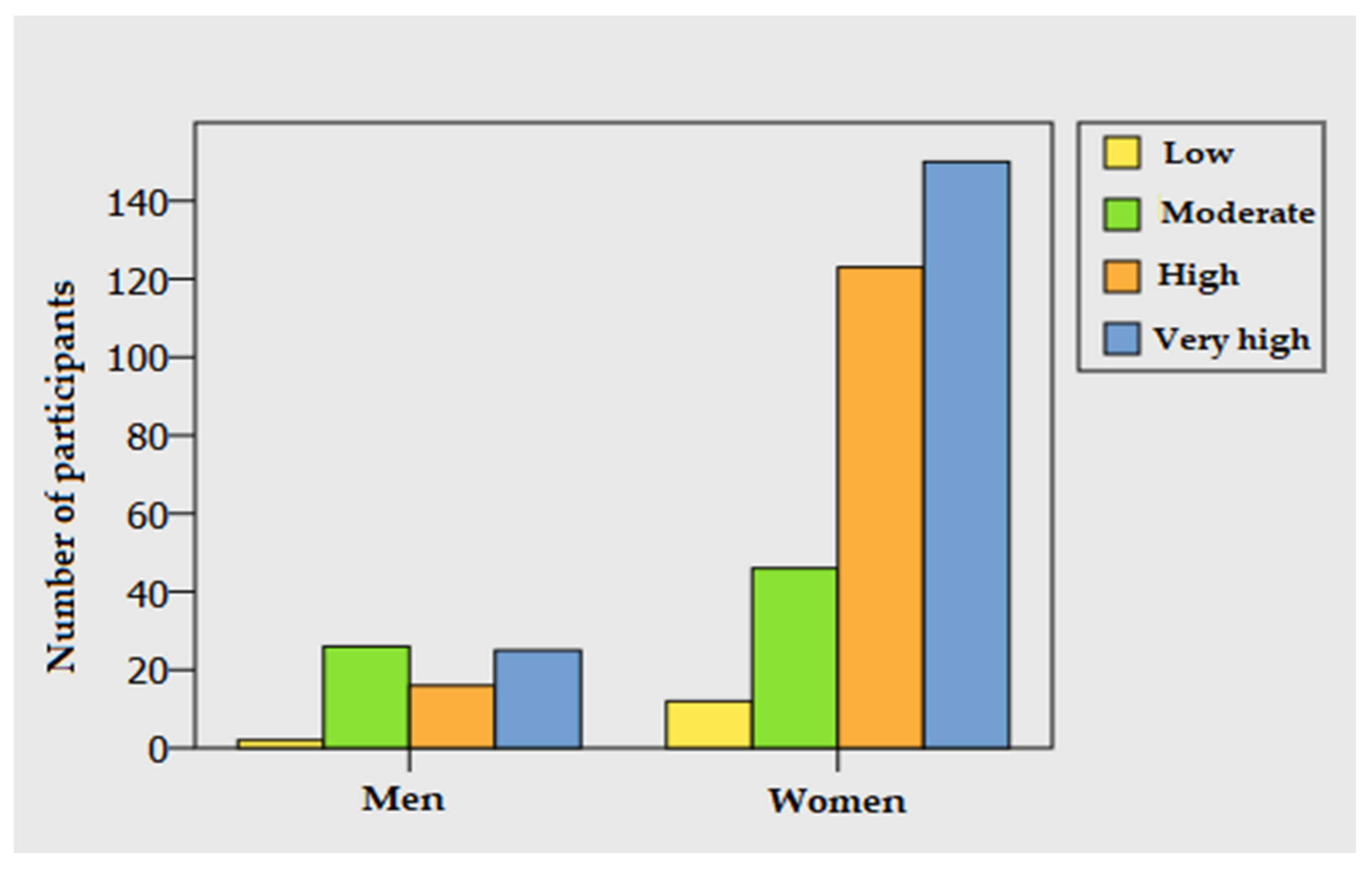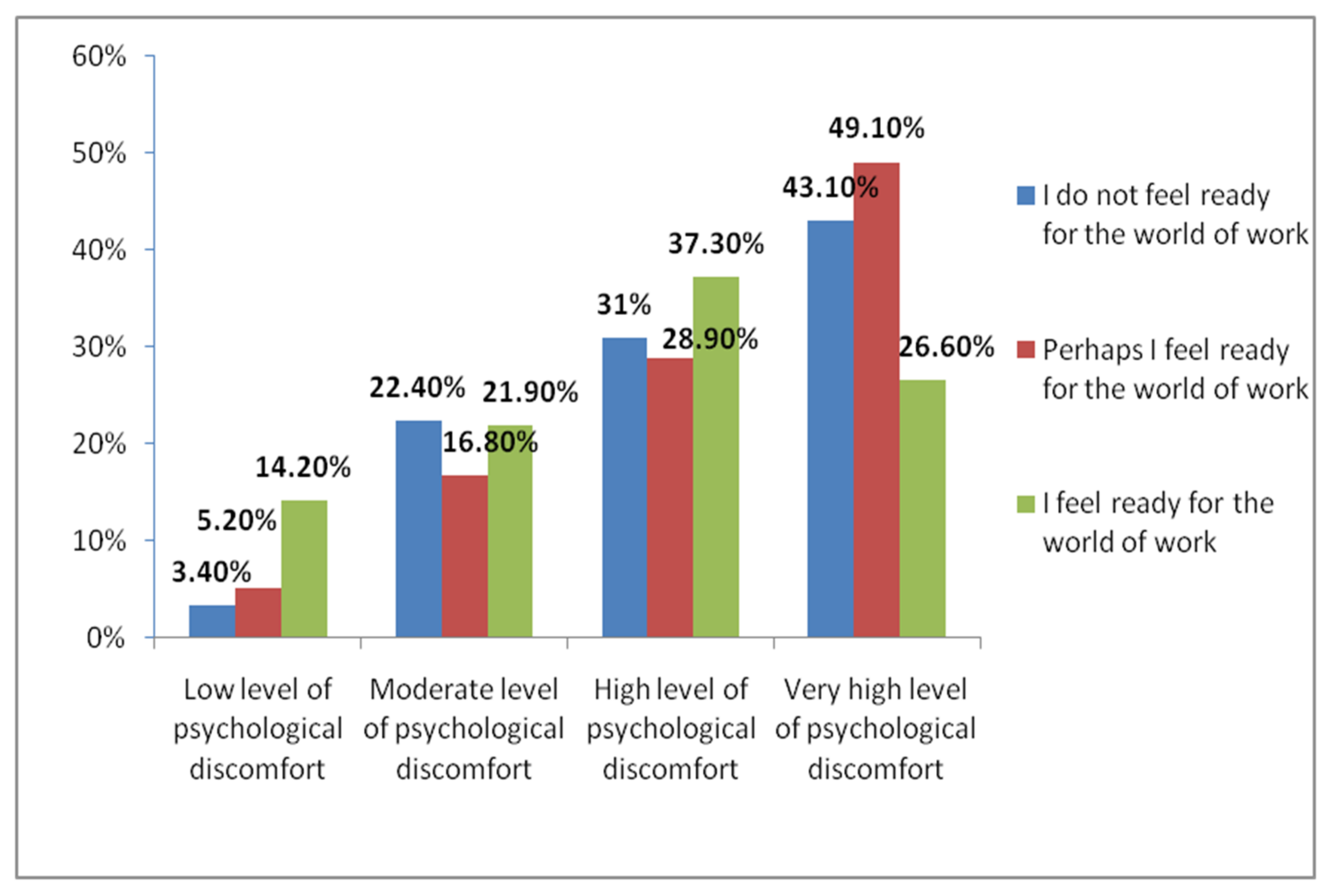Psychological Discomfort in Nursing Degree Students as a Consequence of the COVID-19 Pandemic
Abstract
:1. Introduction
2. Materials and Methods
2.1. Participants
2.2. Procedure
2.3. Evaluation Instruments
2.4. Statistical Analysis
- −
- Pearson’s Chi-squared, to explore the correlation between psychological discomfort and the variables of COVID-19, sex, coexistence (residence during the academic year), and feeling ready for the world of work (training).
- −
- Student’s t, to analyze the relationship between psychological discomfort (anxiety and depression) and age.
- −
- ANOVA, to study the correlation between psychological discomfort and age.
3. Results
3.1. Prevalence of Having Suffered from COVID-19 among the Participants
3.2. Association of Psychological Discomfort with Sex, Residence during the Academic Year, Having Suffered from COVID-19, and Feeling Ready for the World of Work
3.3. Correlation between Psychological Discomfort and Age
3.4. Prevalence of Anxiety and Depression (Psychological Discomfort with the 2-Level K-10)
3.5. Correlation between Psychological Discomfort (2-Level K-10) and Age
3.6. Association of Psychological Discomfort (2-Level K-10) with Sex, Residence during the Academic Year, Having Suffered from COVID-19 and Feeling Ready for the World of Work
4. Discussion
Limitations of the Study
5. Conclusions
Author Contributions
Funding
Institutional Review Board Statement
Informed Consent Statement
Conflicts of Interest
References
- Estupiñán-Martínez, O.R. Catástrofes Epidémicas. Acta Médica del Centro. Published Online at Acta Médica del Centro. Available online: https://www.medigraphic.com/pdfs/medicadelcentro/mec-2013/mec134a.pdf (accessed on 28 October 2021).
- Hernández-Martínez, A.; Rodríguez-Almagro, J.; Martínez-Arce, A.; Romero-Blanco, C.; García-Iglesias, J.J.; Gómez-Salgado, J. Nursing students’ experience and training in health care aid during the COVID-19 pandemic in Spain. J. Clin. Nurs. 2021. [Google Scholar] [CrossRef]
- Aslan, H.; Pekince, H. Nursing students’ views on the COVID-19 pandemic and their perceived stress levels. Perspect. Psychiatr. Care 2020, 57, 695–701. [Google Scholar] [CrossRef] [PubMed]
- Legido-Quigley, H.; Mateos-García, J.T.; Campos, V.R.; Gea-Sánchez, M.; Muntaner, C.; McKee, M. There silience of the Spanish Health system against the COVID-19 pandemic. Lancet Public Health 2020, 5, e251–e252. [Google Scholar] [CrossRef] [Green Version]
- Batres, O. Castilla-LaMancha, Comunidad más Golpeada en Fallecimientos por COVID. Published Online at Redacción Médica. Available online: https://www.redaccionmedica.com/secciones/sanidad-hoy/covid-comunidades-mortalidad-espana-9828 (accessed on 28 October 2021).
- Usher, K.; Wynaden, D.; Bhullar, N.; Durkin, J.; Jackson, D. The mental health impact of COVID-19 on pre-registration nursing students in Australia. Int. J. Ment. Health Nurs. 2020, 29, 1015–1017. [Google Scholar] [CrossRef]
- De-Gagne, J.C.; Cho, E.; Park, H.K.; Nam, J.D.; Jung, D. A qualitative analysis of nursing students’ tweets during the COVID-19 pandemic. Nurs. Health Sci. 2021, 23, 273–278. [Google Scholar] [CrossRef]
- Santamaría, M.D.; Ozamiz-Etxebarria, N.; Rodríguez, I.R.; Alboniga-Mayor, J.J.; Gorrotxategi, M.P. Impacto psicológico dela COVID-19 en una muestrade profesionales sanitarios españoles. Rev. Psiquiatr. Salud. Ment. 2020, 14, 106–112. [Google Scholar] [CrossRef]
- Lai, J.; Ma, S.; Wang, Y.; Cai, Z.; Hu, J.; Wei, N.; Hu, S. Factors associated with mental Health Outcomes among Healthcare workers exposed to coronavirus disease 2019. JAMA Netw. Open 2020, 3, e203976. [Google Scholar] [CrossRef]
- Xing, L.Q.; Xu, M.L.; Sun, J.; Wang, Q.X.; Ge, D.D.; Jiang, M.M.; Li, Q. Anxiety and depression in frontline healthcareworkers during the outbreak of Covid-19. Int. J. Soc. Psychiatry 2020, 1–8. [Google Scholar] [CrossRef]
- Roberts, N.J.; McAloney-Kocaman, K.; Lippiett, K.; Ray, E.; Welch, L.; Kelly, C. Levels of resilience, anxiety and depression in nurses working in respiratory clinical areas during the COVID pandemic. Respir. Med. 2020, 176, 106219. [Google Scholar] [CrossRef] [PubMed]
- Romero-Blanco, C.; Rodríguez-Almagro, J.; Onieva-Zafra, M.D.; Parra-Fernández, M.L.; Prado-Laguna, M.C.; Hernández-Martínez, A. Sleep Pattern Changes in Nursing Students during the COVID-19 Lockdown. Int. J. Environ. Res. Public Health 2020, 17, 5222. [Google Scholar] [CrossRef]
- Garbrah, W.; Kankkunen, P.; Välimäki, T. Gerontological nurse teachers’ abilities and influence on students’ willingness in older people nursing: Across-sectional, correlational survey. Nurse Educ. Today 2020, 90, 104461. [Google Scholar] [CrossRef]
- Hayter, M.; Jackson, D. Pre-registration under graduate nurses and the COVID-19 pandemic: Students or workers? J. Clin. Nurs. 2020, 29, 3115–3116. [Google Scholar] [CrossRef]
- Fowler, K.; Wholeben, M. COVID-19: Outcomes for trauma-impacted nurses and nursing students. Nurse Educ. Today 2020, 93, 104525. [Google Scholar] [CrossRef]
- Savitsky, B.; Findling, Y.; Ereli, A.; Hendel, T. Anxiety and coping strategies among nursing students during the covid-19 pandemic. Nurse Educ. Pr. 2020, 46, 102809. [Google Scholar] [CrossRef]
- Lewnard, J.; Lo, N. Scientific and ethical basis for social-distancing interventions against COVID-19. Lancet Infect. Dis. 2020, 20, 631–633. [Google Scholar] [CrossRef] [Green Version]
- Kochuvilayil, T.; Fernandez, R.S.; Moxham, L.J.; Lord, H.; Alomari, A.; Hunt, L.; Halcomb, E.J. COVID-19: Knowledge, anxiety, academic concerns and preventative behaviours among Australian and Indian undergraduate nursing students: A cross-sectional study. J. Clin. Nurs. 2021, 30, 882–891. [Google Scholar] [CrossRef] [PubMed]
- Yildiz, E. Posttraumatic grow thand positive determinants in nursing students after COVID-19 alarm status: A descriptivecross-sectional study. Perspect. Psychiatr. Care 2021, 1–12. [Google Scholar] [CrossRef]
- Gómez-Ibáñez, R.; Watson, C.; Leyva-Moral, J.M.; Aguayo-González, M.; Granel, N. Final-year nursing students called towork: Experiences of arushed labour in sertion during the COVID-19 pandemic. Nurse Educ. Pr. 2020, 49, 102920. [Google Scholar] [CrossRef]
- Casafont, C.; Fabrellas, N.; Rivera, P.; Olivé-Ferrer, M.C.; Querol, E.; Venturas, M.; Zabalegui, A. Experiences of nursing students as health care aid during the COVID-19 pandemic in Spain: A phemonenological research study. Nurse Educ. Today 2021, 97, 104711. [Google Scholar] [CrossRef]
- Vargas-Terrez, B.; Villamil-Salcedo, V.; Rodríguez-Estrada, C.; Pérez-Romero, J.; Cortés-Sotres, J. Validación de la escala Kessler 10 (K -10) en la detección Kessler P propiedades psicométricas. Salud Mental 2011, 323–331. [Google Scholar] [CrossRef]
- Herrera, L.M.; Rivera, M.S. Prevalence of psychological distress in nursing students associated with sociodemographic, academic and family factors. Ciencia y Enfermería 2011, 55–64. [Google Scholar] [CrossRef]
- Regla, D.; Almirall, A. Manual para Diagnóstico y Tratamiento de Trastornos Ansiosos. MediSur 2012, 466–479. Available online: http://scielo.sld.cu/pdf/ms/v10n5/ms19510.pdf (accessed on 28 October 2021).
- Aranguren, M.; Brenlla, M.E. Estudio de la Validez Discriminante de la “Escala de Malestar Psicológico de Kessler” (Kessler Psychological Distress Scale) en Pacientes Psiquiátricos. In I Congreso Internacional de Investigación y Práctica Profesional en Psicología XVI Jornadas de Investigación Quinto Encuentro de Investigadores en Psicología del MERCOSUR; Facultad de Psicología—Universidad de Buenos Aires: Buenos Aires, Argentina, 2009; Available online: http://jimemorias.psi.uba.ar/index.aspx?anio=2009 (accessed on 21 October 2021).
- Rojas-Solís, J.; Hernández-Corona, M.; García-Ramírez, B.; López Cortés, V. Burnout, malestar psicológico y satisfacción con la vida en policías durante la contingencia sanitaria por COVID-19. Un estudio exploratorio: Burnout, psychological discomfort and life satisfaction in police officers during the health contingency due to COVID-19: An exploratory study. Arch. Med. (Manizales) 2021, 1–19. [Google Scholar] [CrossRef]
- Moxham, L.J.; Fernandez, R.; Kim, B.; Lapkin, S.; Ten Ham-Baloyi, W.; Al Mutair, A. Employment as a predictor of mental health, psychological distress, anxiety and depression in Australian pre-registration nursing students. J. Prof. Nurs. 2018, 34, 502–506. [Google Scholar] [CrossRef] [PubMed]
- Liébana-Presa, C.; Fernández-Martínez, M.E.; Gándara, Á.R.; Muñoz-Villanueva, M.C.; Vázquez-Casares, A.M.; Rodríguez-Borrego, M.A. Psychological distress in health sciences college students and its relationship with academic engagement. Rev. Esc. Enferm. 2014, 48, 715–722. [Google Scholar] [CrossRef] [PubMed] [Green Version]
- Rísquez, M.I.R.; García, C.C.; De-Los-Ángeles-Sabuco-Tebar, E. Resiliencia y Síndrome de Burnout en estudiantes de enfermería y su relación con variables sociodemográficas y de relación interpersonal. Int. J. Psychol. Res. 2012, 88–95. [Google Scholar] [CrossRef]
- Ng, Q.X.; Lim, D.Y.; Chee, K.T. Reimagining the spectrum of affective disorders. Bipolar Disord. 2020, 22, 638–639. [Google Scholar] [CrossRef] [PubMed]



| Coexistence Unit During the Academic Year | Low Level of Psychological Discomfort | Very High Level of Psychological Discomfort |
|---|---|---|
| -Two or more roommates | ||
| -Partner and child | ||
| -Father and mother | ||
| -Partner and partner’s child | ||
| -Roommates and partner | ||
| -Father, mother, and sister | ||
| -Parents and siblings | ||
| -Brother | ||
| -Mother and brother | ||
| -Mother, stepfather, and three siblings | ||
| -Friends (females) | ||
| -One or more non-university roommates | 0% | 100% |
| -Classmates | ||
| -Mother and siblings | ||
| -Father | ||
| -Student accommodation | ||
| -Maternal grandparents, mother, stepfather, and younger sister | ||
| -Roommates from the same university | ||
| -Daughter | ||
| -Sister | 100% | 0% |
| -Mother and sister | ||
| -Father, mother, and brother |
| Range OF K-10 (2 Levels) | |||
|---|---|---|---|
| Low | High | ||
| N | % | N | % |
| 63 | 15.75% | 337 | 84.25% |
Publisher’s Note: MDPI stays neutral with regard to jurisdictional claims in published maps and institutional affiliations. |
© 2021 by the authors. Licensee MDPI, Basel, Switzerland. This article is an open access article distributed under the terms and conditions of the Creative Commons Attribution (CC BY) license (https://creativecommons.org/licenses/by/4.0/).
Share and Cite
Espina-López, F.; Moreno-Sánchez, E.; Gago-Valiente, F.-J.; Sáez-Padilla, J.; Salado-Navarro, V.; Merino-Godoy, M.-d.-l.-Á. Psychological Discomfort in Nursing Degree Students as a Consequence of the COVID-19 Pandemic. J. Clin. Med. 2021, 10, 5467. https://doi.org/10.3390/jcm10235467
Espina-López F, Moreno-Sánchez E, Gago-Valiente F-J, Sáez-Padilla J, Salado-Navarro V, Merino-Godoy M-d-l-Á. Psychological Discomfort in Nursing Degree Students as a Consequence of the COVID-19 Pandemic. Journal of Clinical Medicine. 2021; 10(23):5467. https://doi.org/10.3390/jcm10235467
Chicago/Turabian StyleEspina-López, Fernando, Emilia Moreno-Sánchez, Francisco-Javier Gago-Valiente, Jesús Sáez-Padilla, Vanesa Salado-Navarro, and María-de-los-Ángeles Merino-Godoy. 2021. "Psychological Discomfort in Nursing Degree Students as a Consequence of the COVID-19 Pandemic" Journal of Clinical Medicine 10, no. 23: 5467. https://doi.org/10.3390/jcm10235467
APA StyleEspina-López, F., Moreno-Sánchez, E., Gago-Valiente, F.-J., Sáez-Padilla, J., Salado-Navarro, V., & Merino-Godoy, M.-d.-l.-Á. (2021). Psychological Discomfort in Nursing Degree Students as a Consequence of the COVID-19 Pandemic. Journal of Clinical Medicine, 10(23), 5467. https://doi.org/10.3390/jcm10235467









